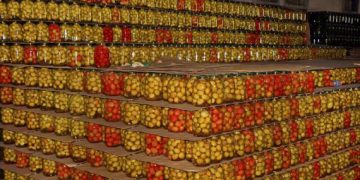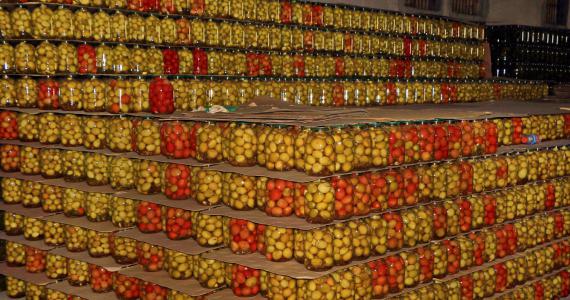About 20 years ago, a peasant (farming) enterprise “Nalmes” appeared on the agricultural map of the Leskensky district, which means “diamond” in Adyghe. And all these years it has been growing and processing vegetable crops, mainly cucumbers and tomatoes.
According to the head of the local administration of the Leskensky municipal district, Safarbiya Inzhizhokov, for almost two decades, K (F) X “Nalmes” has supplied several hundred million conditional cans of canned vegetables to the Russian market. Moreover, the products of Lesken canners are in high demand in the domestic agri-food market.
According to the established tradition, the canning mini-farm of the farm in the new season was among the first among the specialized enterprises of the region to start processing the new crop of cucumbers and tomatoes. Yesterday we visited the Anzorey, where K(F)H “Nalmes” conducts financial and economic activities, and made sure that the mass collection of vegetable crops and their processing is in full swing here.
According to the head of the farm Murat Sheozhev, this season, in order to ensure a guaranteed raw material base, the farm sowed vegetables on 23 hectares, including cucumbers – 18 hectares, three hectares of tomatoes and two hectares of dill.
“Over the past years, we have traditionally rented arable land in our area for growing high-yielding varieties of cucumbers and tomatoes, suitable specifically for canning,” explained Lyudmila Shkezheva, chief technologist of the enterprise. “Earlier, every season we experienced problems with dill, which is an essential component in canning cucumbers and tomatoes. The problem was solved simply and with economic benefits – they themselves began to grow fragrant seasoning for production needs. Dill gives a special aroma and has a beneficial effect on the taste of canned cucumbers and tomatoes. As a seasoning, dill is traditionally used in our national cuisine, including in the manufacture of canned vegetables. This fragrant herb among the Circassians is considered an indispensable tool for normalizing digestion and helping with diabetes. By adding dill to canned food, we pursue other, very noble goals: this plant, according to authoritative scientists, is anti-inflammatory, antimicrobial, capable of normalizing stomach functions by eliminating irritation and discomfort. Dill is used in traditional herbal medicine to treat and prevent diseases of the digestive and genitourinary system, eliminate breathing problems, activate lactation, and also to lower cholesterol and glucose levels. And the second necessary product for canned vegetables is garlic, which we buy from local farmers and owners of personal farmsteads.
From pure raw materials of their own production, Lesken canned farmers make an environmentally friendly natural product that is in demand on the republican and Russian markets. Farm canned vegetables are not an ordinary food product.
Consumers of K(F)H “Nalmes” canned products are preschool institutions, sanatoriums and rest homes, healthcare organizations, elite restaurant business enterprises in different regions of the Russian Federation.
The head of the peasant (farming) economy also said that since the beginning of this season, more than 100 jobs have already been created for residents of the regional center and the nearby villages of Khatuei, Lesken II, Erokko and Ozrek. Villagers work picking vegetables in the field and on the processing line at the mini-factory. On average, a team of 30 people produces about 73,000 conditional cans of canned cucumbers per shift. Mini-factory K(F)X “Nalmes” plans this year to supply the domestic market as part of import substitution about 7 million conditional cans of canned food – these are cucumbers, tomatoes, as well as assorted of these two crops.
According to the regional Ministry of Agriculture, last year the farm delivered about 6 million 532 thousand conditional cans of high quality canned vegetables to other regions of Russia.
- At one time, eight enterprises were engaged in the production of fruits and vegetables in the Leskensky district, – commented the head of the Association of Peasant (Farm) Enterprises and Agricultural Cooperatives (AKKOR) of the Kabardino-Balkarian Republic Inal Alakaev. – The only peasant (farming) enterprise “Nalmes” survived the competition, which indicates that the farming movement has real power in the republic, and only thanks to the farmers the regional agro-industrial cluster retains the status of the undisputed driver of the entire economic block of the KBR. It is the agricultural sector, where peasant (farmer) households make the weather, that provides over 40% (by the end of 2021) of the gross regional product of Kabardino-Balkaria.
It is worth adding that the Leskensky district has long been considered a “vegetable” region, here the natural and climatic conditions, peasant traditions accumulated over the centuries, and the resource potential favor local communities.































